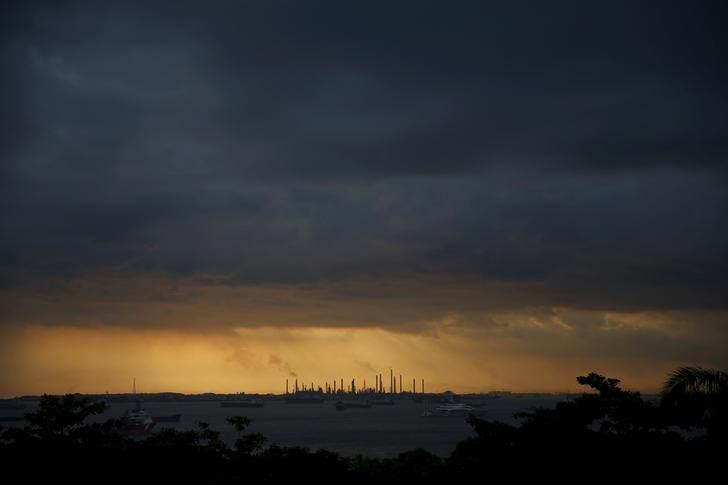By Florence Tan, Chen Aizhu and Sumeet Chatterjee
SINGAPORE (Reuters) - Banks and trading companies are scaling down activities in Asia following the oil price collapse and financial problems at three companies including major Singapore trader Hin Leong, according to eight sources familiar with the matter.
The problems are threatening commerce in Singapore, Asia's commodities trade hub, the banking and trading sources said. Billions of dollars of physical and derivative commodities change hands in the city-state in a supply chain that links financial institutions with traders and logistics companies that deliver fuel to the Asia-Pacific region and beyond.
The revelation of hundreds of millions of dollars of losses at Hin Leong Trading Pte Ltd (HLT), one of Asia's largest oil traders, came months after Agritrade International Pte Ltd entered into judicial management to restructure a $1.5 billion of debt, and Hontop Energy (Singapore) Pte Ltd went into receivership.
Scorched by losses at these companies and the crash in global oil prices (LCOc1) since the start of the year, several banks are tightening credit and have also stepped up scrutiny on existing loans to oil trading companies, the sources said.
All existing and new credit lines to commodities traders in Asia are being put under stringent review by banks' senior management following HLT's losses and the crash in oil prices, two senior bankers told Reuters. They represent leading global trade finance banks that are two of Hin Leong's top-10 creditors.
One of the bankers, from a European lender, said there was concern there could be further defaults in the region as oil prices plunge.
HLT has not responded to requests for comment on its losses.
The trader's problems were "a trigger" for some banks to cut credit lines significantly, said a third commodities banker.
"Banks have become more selective and are making cautious decisions on trading companies," he added. "It doesn't help that oil prices are volatile and continue to be volatile."
Banks have also cut more risky credit lines to some companies which do not require letters of credits (LCs) from counterparties, a Singapore-based oil trader said. Risky credit lines are usually provided to bigger companies which have been in the business for a long time, he added.
INVENTORY FINANCING
Financiers have also become wary of deals to finance oil inventories after the founder of HLT said the company had sold "a substantial part of inventory" being financed by banks to raise cash after it ran into cashflow problems.
A fourth banker said lenders were re-evaluating how to finance the commodities trade, especially when it came to pure trading firms without oil production or refining arms, and that they wanted to have a clear understanding of trade flows before offering finance.
A fifth banking source said: "What happened with HLT and yesterday's negative WTI price effectively invalidated the very foundations commodity trade financing are built upon."
"When you can't trust the client or the value of underlying commodities, there is nothing to be financed. The industry will have to change," he added.
U.S. West Texas Intermediate (WTI) crude futures traded in negative territory on Tuesday as concern grew the sector will run out of storage for a glut caused by the coronavirus lockdown.
TRADERS SCALE BACK
Faced with tighter credit and rising counterparty risks, trading companies have also scaled back their activities, the sources said.
"As credit gets tightened, highly leveraged oil companies will stagger – there will be difficulties in open LCs and credit terms and sleeves would be withdrawn," said Baldev Bhinder, managing director of law firm Blackstone (NYSE:BX) & Gold.
"Without liquidity, the smooth flow of oil between many inter-dependent companies will slow down and there is likely to be a domino effect."
Unlike previous oil price crashes, fuel demand has also taken a big hit because of measures taken by governments to curb the coronavirus pandemic heightening fears of defaults among oil companies, the sources said.
"Counterparty risks are very high. Who would dare to trade with anyone?" said a senior executive at a Singapore-based trading company. "The economy won't recover as fast as before. The aviation sector is also unlikely to recover this year."
A senior trader with a European trading house said mid and small-sized companies would be worst hit by a credit squeeze.
The third banker said the market as a whole would shrink, as everyone would trade less. However, he added, "there is still a lot of oil to be sold given the significant supply out there and there will be traders working to capitalise it".
Enterprise Singapore, a government agency that runs a programme to encourage global traders to base activities in the city, said it was monitoring developments in the sector.
"We will take further actions as necessary to support companies that have been adversely impacted by COVID-19," a spokeswoman added.
